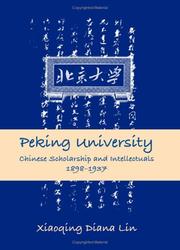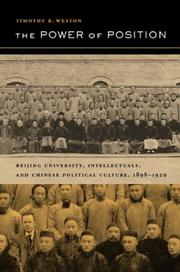| Listing 1 - 5 of 5 |
Sort by
|
Book
ISBN: 9780231152389 9780231526289 Year: 2010 Publisher: New York, NY
Abstract | Keywords | Export | Availability | Bookmark
 Loading...
Loading...Choose an application
- Reference Manager
- EndNote
- RefWorks (Direct export to RefWorks)
Higher education and state --- History --- Beijing da xue --- Students --- Political activity. --- S04/0811 --- S14/0400 --- China: History--May 4th Movement --- China: Education--Modern education: before 1949 (incl. Modern intellectual trends) --- Education, Higher --- State and higher education --- Education and state --- Government policy --- Pei-ching ta hsüeh --- National University of Peking --- Metropolitan University (Beijing, China) --- Universität Peking --- Beijing (China). --- Guo li Beijing da xue --- Bei jing da xue --- Peking University --- Université de Pékin --- Beijing University --- Kokuritsu Pekin Daigaku --- Pei ta (China) --- Universität Beijing --- Pekinger Reichsuniversitaet --- Pukkyŏng Taehak --- Begejing Yeke Surġaġuli --- Universitas Peking --- 北京大〓 --- 北京大学 --- 北京大學 --- 國立北京大學 --- Jing shi da xue tang (Beijing, China)

ISBN: 0791463214 0791483916 1423743709 9781423743705 9780791463215 9780791483916 0791463222 9780791463222 Year: 2005 Publisher: Albany : ©2005 State University of New York Press,
Abstract | Keywords | Export | Availability | Bookmark
 Loading...
Loading...Choose an application
- Reference Manager
- EndNote
- RefWorks (Direct export to RefWorks)
Peking University, founded in 1898, was at the center of the major intellectual movements of twentieth-century China. In this institutional and intellectual history, author Xiaoqing Diana Lin shows how the university reflected and shaped Chinese intellectual culture in an era of great change, one that saw both a surge of nationalism and an interest in Western concepts such as democracy, science, and Marxism. Lin discusses Peking University's spirit of openness and how the school both encouraged the synthesis of Chinese and Western knowledge and promoted Western learning for the national good. The work covers the introduction of modern academic disciplines, the shift from integrative learning to specialized learning, and the reinterpretation of Confucianism for contemporary times.
#PBIB:2005.3 --- S14/0400 --- 378.4 <510 BEIJING> --- China: Education--Modern education: before 1949 (incl. Modern intellectual trends) --- Universiteiten--China--BEIJING --- Beijing da xue --- Pei-ching ta hsüeh --- National University of Peking --- Metropolitan University (Beijing, China) --- Universität Peking --- Beijing (China). --- Guo li Beijing da xue --- Bei jing da xue --- Peking University --- Université de Pékin --- Beijing University --- Kokuritsu Pekin Daigaku --- Pei ta (China) --- Universität Beijing --- Pekinger Reichsuniversitaet --- Pukkyŏng Taehak --- Begejing Yeke Surġaġuli --- Universitas Peking --- 北京大〓 --- 北京大学 --- 北京大學 --- 國立北京大學 --- Jing shi da xue tang (Beijing, China) --- History --- China --- Intellectual life --- Learning and scholarship --- Erudition --- Scholarship --- Civilization --- Education --- Research --- Scholars
Book
ISBN: 3642375146 3642375154 Year: 2013 Publisher: New York : Springer,
Abstract | Keywords | Export | Availability | Bookmark
 Loading...
Loading...Choose an application
- Reference Manager
- EndNote
- RefWorks (Direct export to RefWorks)
This study explores the process of curriculum innovation—the Yuanpei Program, which is intended to provide general education at Peking University and offers key insights in terms of theory and practice. First, it contributes to development of the understanding of curriculum innovation and the enrichment of knowledge on general education, its principles and practice in China. More specifically, it enriches the literature on the curriculum reform in higher education by describing the complexity of the process in the Chinese context. The conflict approach to examining the curriculum change has allowed the author to better understand the difficulty and constraints involved in the innovation. Many studies conducted before tend not to focus on conflicts and constraints in a systematic way, thus leaving many aspects to be investigated. The data on general education reforms practices obtained from the study will expand the understanding of general education reforms in the Mainland context. Second, this study will provide a valuable reference work on reforms in higher education in China. The general education reforms, though conducted at several universities, are still in the trial stage. The lessons learned from the study illustrate what kinds of conflicts and problems might arise, supporting practitioners by addressing sources of conflicts that could be avoided or effectively defused.
Curriculum change. --- Beijing da xue. --- Education, Higher -- China. --- General education -- China. --- Pei-ching ta hsüeh --- National University of Peking --- Metropolitan University (Beijing, China) --- Universität Peking --- Beijing (China). --- Guo li Beijing da xue --- Bei jing da xue --- Peking University --- Université de Pékin --- Beijing University --- Kokuritsu Pekin Daigaku --- Pei ta (China) --- Universität Beijing --- Pekinger Reichsuniversitaet --- Pukkyŏng Taehak --- Begejing Yeke Surġaġuli --- Universitas Peking --- 北京大〓 --- 北京大学 --- 北京大学. --- 北京大学xDissertations --- 北京大學 --- 北京大學學报 --- 四川大学 --- 國立北京大學 --- Education. --- Literacy. --- Emigration and immigration. --- Migration. --- Immigration --- International migration --- Migration, International --- Population geography --- Assimilation (Sociology) --- Colonization --- Illiteracy --- Education --- General education --- Children --- Education, Primitive --- Education of children --- Human resource development --- Instruction --- Pedagogy --- Schooling --- Students --- Youth --- Civilization --- Learning and scholarship --- Mental discipline --- Schools --- Teaching --- Training --- Jing shi da xue tang (Beijing, China) --- Curriculum reform --- Instructional change --- Reform, Curriculum --- Curriculum planning --- Curricula

ISBN: 9786612357077 1282357077 052092990X 1597348287 9780520929906 1417525673 9781417525676 9781597348287 661235707X 0520237676 9780520237674 9781282357075 Year: 2004 Publisher: Berkeley : ©2004 University of California Press,
Abstract | Keywords | Export | Availability | Bookmark
 Loading...
Loading...Choose an application
- Reference Manager
- EndNote
- RefWorks (Direct export to RefWorks)
Throughout the twentieth century, Beijing University (or Beida) has been at the center of China's greatest political and cultural upheavals-from the May Fourth Movement of 1919 to the Cultural Revolution of the 1960's to the tragic events in Tiananmen Square in 1989. Why this should be-how Beida's historical importance has come to transcend that of a mere institution of higher learning--is a question at the heart of this book. A study of intellectuals and political culture during the past century's tumultuous early decades, The Power of Position is the first to focus on Beida, China's oldest and best-known national university. Timothy B. Weston portrays the university as a key locus used by intellectuals to increase their influence in society. Weston analyzes the links between intellectuals' political and cultural commitments and their specific manner of living. He also compares Beijing's intellectual culture with that of the rising metropolis of Shanghai. What emerges is a remarkably nuanced and complex picture of life at China's leading university, especially in the decades leading up to the May Fourth Movement.
Political culture --- Higher education and state --- Education, Higher --- State and higher education --- Education and state --- History. --- Government policy --- Beijing da xue --- Jing shi da xue tang (Beijing, China) --- Pei-ching ta hsüeh --- National University of Peking --- Metropolitan University (Beijing, China) --- Universität Peking --- Beijing (China). --- Guo li Beijing da xue --- Bei jing da xue --- Peking University --- Université de Pékin --- Beijing University --- Kokuritsu Pekin Daigaku --- Pei ta (China) --- Universität Beijing --- Pekinger Reichsuniversitaet --- Pukkyŏng Taehak --- Begejing Yeke Surġaġuli --- Universitas Peking --- 北京大〓 --- 北京大学 --- 北京大學 --- 國立北京大學 --- S02/0210 --- S11/0708 --- S11/0709 --- S14/0200 --- S14/0400 --- History --- China: General works--Intellectuals: general and before 1840 --- China: Social sciences--Elite --- China: Social sciences--Cadres (incl. political commissars) --- China: Education--General works --- China: Education--Modern education: before 1949 (incl. Modern intellectual trends) --- academia. --- beida. --- beijing university. --- beijing. --- china. --- chinese anarchism. --- chinese culture. --- chinese history. --- chinese intellectuals. --- chinese republic. --- chinese students. --- citizenship. --- college campus. --- college. --- cultural revolution. --- democracy. --- free speech. --- higher education. --- history. --- intellectual culture. --- may fourth movement. --- national university. --- nonfiction. --- peoples republic. --- politics. --- protest. --- rebellion. --- resistance. --- shanghai. --- social change. --- social influence. --- social standing. --- student protest. --- student. --- tiananmen square. --- university.
Book
ISBN: 080479779X 9780804797795 9780804796071 0804796076 9780804797788 0804797781 Year: 2016 Publisher: Stanford, Calif.
Abstract | Keywords | Export | Availability | Bookmark
 Loading...
Loading...Choose an application
- Reference Manager
- EndNote
- RefWorks (Direct export to RefWorks)
China's One Child Policy and its rigorous national focus on educational testing are well known. But what happens to those "lucky" few at the very top of the pyramid: elite university students in China who grew up under the One Child Policy and now attend the nation's most prestigious universities? How do they feel about having made it to the top of an extremely competitive educational system—as their parents' only child? What pressures do they face, and how do they cope with the expectations associated with being the best? Fragile Elite explores the contradictions and perplexities of being an elite student through immersive ethnographic research conducted at two top universities in China. Susanne Bregnbæk uncovers the intimate psychological strains students suffer under the pressure imposed on them by parents and state, where the state acts as a parent and the parents reinforce the state. Fragile Elite offers fascinating insights into the intergenerational tensions at work in relation to the ongoing shift in educational policy and definition of what a "quality" student, child, and citizen is in contemporary China.
College students --- Education, Higher --- Higher education --- Postsecondary education --- Universities and colleges --- College life --- University students --- Students --- Social conditions. --- Family relationships --- Social aspects --- Education --- Beijing da xue --- Qing hua da xue (Beijing, China) --- Qinghua da xue (Beijing, China) --- Tsing Hua University (Beijing, China) --- Tsinghua University (Beijing, China) --- Qinghua University (Beijing, China) --- Chʻing hua ta hsüeh (Beijing, China) --- Guo li qing hua da xue (Beijing, China) --- National Tsing Hua University (Beijing, China) --- Qing hua xue xiao (Beijing, China) --- Tsing Hua College (Beijing, China) --- 淸华大学 (北京中囯) --- 淸华大学 (北京中国) --- 淸华大学 (北京中國) --- 淸华大学 (北京) --- 淸华大学 (北京, China) --- 淸华大学 (Beijing, China) --- 淸华大學 (Beijing, China) --- 淸华華大学 (北京中囯) --- 淸華大学 (Beijing, China) --- 淸華大學 (北京中國) --- 淸華大學 (北京) --- 淸華大學 (Beijing, China) --- 淸華大學 (Piking, China) --- 清华大学 (北京中囯) --- 清华大学 (北京中国) --- 清华大学 (北京中國) --- 清华大学 (北京) --- 清华大学 (Beijing, China) --- 清华大學 (Beijing, China) --- 清華大学 (北京中國) --- 清華大学 (Beijing, China) --- 清華大學 (北京中國) --- 清華大學 (北京) --- 清華大學 (北京, China) --- 清華大學 (Beijing, China) --- Jing shi da xue tang (Beijing, China) --- Pei-ching ta hsüeh --- National University of Peking --- Metropolitan University (Beijing, China) --- Universität Peking --- Beijing (China). --- Guo li Beijing da xue --- Bei jing da xue --- Peking University --- Université de Pékin --- Beijing University --- Kokuritsu Pekin Daigaku --- Pei ta (China) --- Universität Beijing --- Pekinger Reichsuniversitaet --- Pukkyŏng Taehak --- Begejing Yeke Surġaġuli --- Universitas Peking --- 北京大〓 --- 北京大学 --- 北京大學 --- 國立北京大學 --- Students. --- S14/0454 --- S11/0708 --- S11/0497 --- S11/0731 --- China: Education--Education: since 1989 --- China: Social sciences--Elite --- China: Social sciences--Society since 1976 --- China: Social sciences--Childhood, youth
| Listing 1 - 5 of 5 |
Sort by
|

 Search
Search Feedback
Feedback About
About Help
Help News
News